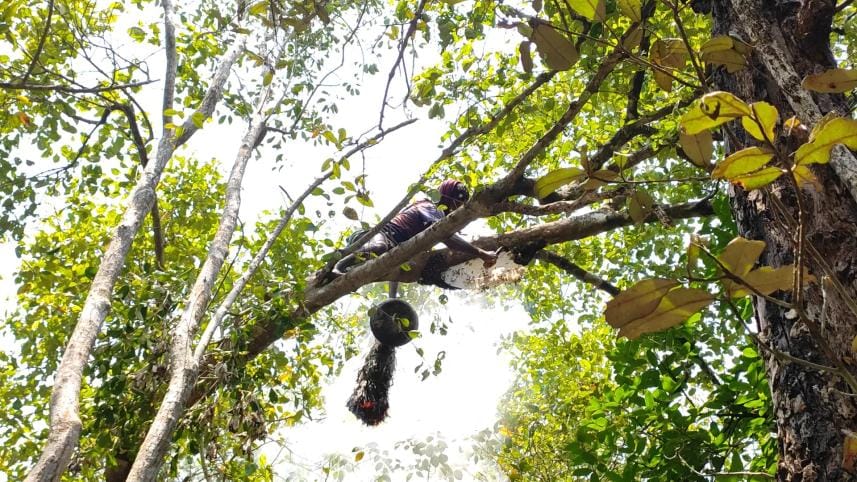Move to get GI status for Sundarbans' honey finally gathers steam

Seven years after an application by the deputy commissioner of Bagerhat district, the Department of Patents, Designs and Trademarks (DPDT) has finally taken the initiative to register Sundarbans' honey as a GI (geographical indication) product.
The information obtained after reviewing the application of the deputy commissioner was incorporated in the form of a journal and sent to the Bangladesh Government Press today, according to a press release from the Ministry of Industries, which oversees the DPDT.
If no objection or opposition from any third party is received within two months of the publication of the journal, the product will be registered as a GI product, it added.
The GI sign is used on products to certify that they possess certain qualities enabled by the environment, weather and culture of a specific geographical location. This enhances branding and creates a separate demand for the product.
The rush to secure GI status for Sundarbans' honey only gathered steam after a social media post by India's West Bengal Forest Department on May 16, through which it confirmed that it had been issued with the GI tag for honey sourced from the world's largest mangrove forest.
The Sundarbans is spread out between Bangladesh and India, with around 60 percent of the forest lying within the former's borders.
India's West Bengal Forest Development Corporation Ltd applied for the GI rights for Sundarbans' honey on July 12, 2021 and the tag was issued on January 2, 2024.
After this information came to light, experts from the Centre for Policy Dialogue said Bangladesh should explore potential avenues for joint protection of shared GI with India and put in place a legal framework to safeguard the country's traditional products.
A similar furore had unfolded surrounding the GI status of Tangail Saris earlier this year after India's Ministry of Culture announced that the West Bengal State Handloom Weavers Co-Operative Society secured the GI status for 'Tangail Saree of Bengal'.
This triggered outrage and criticism from Bangladeshi citizens, with many questioning why Bangladesh failed to get GI recognition despite being the rightful claimant.
As such, the government unveiled measures to secure the GI status before the GI certificate for Tangail Sari was issued on April 25 this year.
Collective apathy was largely attributed for that case, with no party applying to register the Tangail Sari as a GI product until the news broke that India had secured the status.
However, that was not the issue this time, according to Munim Hassan, director general of the DPDT.
He blamed a lack of urgency from the applicants' side for the huge delay.
He said the deputy commissioner of Bagerhat had submitted an application to register honey from the Sundarbans as a GI product on August 7, 2017, but had not replied to any queries afterwards.
"After examining the application in November of 2017, the deputy commissioner was informed through a letter that there was a shortage of documents, which they needed to provide so we could take the next steps. But they did not respond to the letter until 2019.
"When they did reply, they did not provide all the necessary information we asked for. So, they were sent a letter again outlining the information we needed," he said.
This procedure was brought to a complete halt in 2020 and 2021 due to the Covid-19 pandemic, he informed.
After a return to normalcy in February 2023, the district administration of Bagerhat was again asked to send the information.
But there was no response at that time either, he said.
"I joined DPDT in September 2023. Then I talked to the deputy commissioner of Bagerhat about the matter. Then we came to know that the honey has to be tested in a laboratory. Then that was done too," he said.
"It took a long time to collect various information and complete the official procedure. Today (Sunday), the data was sent to BG Press for publication in the GI journal. The GI journal will be published as soon as possible," he said.
He also highlighted that the DPDT itself could not do anything if applicants were lackadaisical.
"Anyone who applies for GI recognition for any product should have more urgency. We only issue certificates. If no one updates the information timely, we cannot do anything," he added.
Khalid Hossain, current deputy commissioner of the Bagerhat District, told The Daily Star today: "Whenever we are asked for information, we try to provide it as soon as possible. Some information has to be collected from other stakeholders. That's why it's late."
Faisal Hassan, a senior information officer of the Ministry of Industries, added: "In response to DPDT's request, the Bangladesh Standards and Testing Institution prepared a test report on the nutritional value of honey in the Sundarbans and provided it to the DPDT."
He also added that the applicant had finally submitted all the required information on June 27 this year.
While official records are not available, it is estimated that around 200-300 tonnes of honey is extracted from the forest annually in Bangladesh, according to CPD documents. On the other hand, India produces around 110 tonnes annually, the document showed.
The DPDT has listed 31 GI products as of April 30, 2024.




 For all latest news, follow The Daily Star's Google News channel.
For all latest news, follow The Daily Star's Google News channel.
Comments